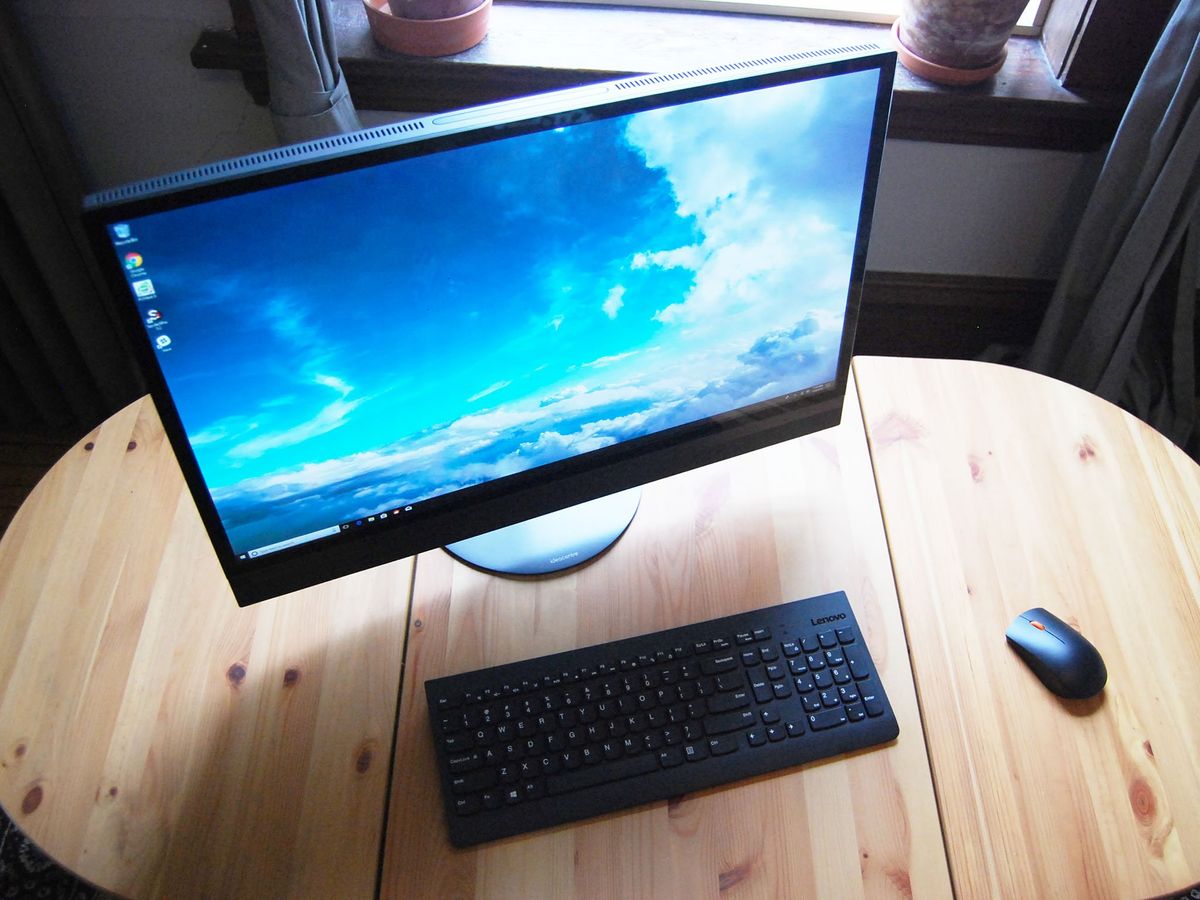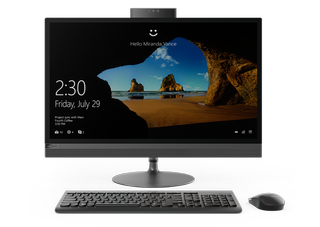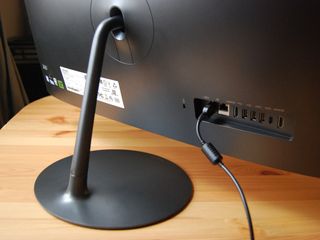
In the world of all-in-one (AIO) PCs, manufacturers need to figure out how to fit a lot of hardware into something that's usually no larger than a standard monitor. Prices can creep up quickly as hardware shrinks, similar to what we see with laptops, and if it's not done properly, you may get a large, heavy device that suffers from performance issues.
Lenovo's IdeaCentre 520, part of its AIO lineup that also includes the 900 series, is positioned as an upper mid-range PC meant for home use. It doesn't have the hardware inside for specialized tasks, but it can easily handle everyday ones, like word processing, video watching, web browsing, and some light to medium gaming.
Do the IdeaCentre 520's performance and design warrant the starting price of about $990? I used this AIO for about a week to come up with an answer.

Starts at $990
Bottom Line: The IdeaCentre AIO is certainly a looker, and it has the performance to back it up. As long as you have room and don't plan on any specialized tasks, it should serve you well.Pros:
Pop-up IR camera.Bright touch display with great color.Decent port selection.Optical drive.Cons:
Heavy!Slow hard-disk drive (HDD).No display rotation.What you'll love about the IdeaCentre AIO 520
There's no way around it — the IdeaCentre AIO 520 looks like a premium device. The back has a gentle curve, and the sides are thick but have ample venting to keep the touch display and performance hardware cool.
It's sturdy and well put together, with no seams sticking out or unsightly gaps between components. The big display sits at the same depth as the speaker row beneath it, giving it a complete look your eyes kind of glide over. In the top of the PC is a pop-up 1080p webcam that's great for video conferencing, and you also get an IR sensor for logging in through Windows Hello.
| Category | Specs |
|---|---|
| Form factor | All-in-one |
| Display | 27-inch 1440p (QHD) IPS touch |
| Processor | Seventh-gen Intel Core i7-7700T (up to 3.80GHz) |
| Graphics | Intel HD Graphics 630 |
| RAM | 16GB DDR4-2400MHz |
| Camera | 1080p pop-up, IR for Windows Hello |
| Storage | 1TB HDD and 16GB Optane memory |
| Ports | USB-C, 2x USB-A 3.0, 2x USB-A 2.0, HDMI in, HDMI out, RJ45 Ethernet, SD card reader, 3.5mm audio jack |
| Size | 24.6 in x 18.9 in x 2.7 in (624.35 mm x 479.4 mm x 68 mm) |
| Weight | 23.15 pounds (10.5 kg) |
The display is brighter than a lot of devices Lenovo puts out, hitting somewhere around 350 nits of brightness when maxed out. If you're planning on using this PC in a room with lots of light, it shouldn't be a problem, even if the glossy finish picks up fingerprints. As for color, testing gave me 100 percent sRGB and 79 percent AdobeRGB, both excellent results that give a deep picture.
I benchmarked the seventh-gen, quad-core processor (CPU), integrated Intel graphics (GPU), and 7,200RPM HDD, and all but the HDD gave satisfactory results. A PCMark Home Conventional test gave a score of 3,180 (right where high-end laptops sit), a Geekbench 4 CPU test gave a single-core score of 4,285 and quad-core score of 12,576 (right where seventh-gen CPUs should be), and the Geekbench 4 GPU test gave a score of 18,982, high enough to be useful for some light to medium gaming.
Get the Windows Central Newsletter
All the latest news, reviews, and guides for Windows and Xbox diehards.
The ports are all nestled in a group on the back — except one USB-A 3.0 port on the left side — next to the power supply. There's a good selection of old and new ports, but there's no Thunderbolt 3, something that could be used to hook up an external GPU if you want to use the AIO for some heavy gaming. However, there are both HDMI in and out, meaning you can use the display with another PC.
Finally, what looks like a long row of speakers beneath the display actually houses two 3W speakers that get respectably loud. Sound is clear no matter the volume, and since it's directed straight at you, it is quite enjoyable, even while listening in a relatively large open space.






What you'll dislike about the IdeaCentre AIO 520
While the IdeaCentre AIO 520 has a premium look and feels well-built, it is bulky compared to some other AIOs on the market. It also weighs just over 23 pounds, so when it's in place, you'll probably want to leave it there. This isn't meant to be carried around, but you'll nevertheless need a decent amount of space on your desk to fit its 27-inch display comfortably. Complicating things a bit is the display's inability to rotate on its stand. For this much money, a stand that lets you turn the display a few different ways would be appreciated.
Where performance is otherwise quite good, the 7,200RPM HDD hit a read speed of 926 MB/s while only hitting an abysmal 152.1 MB/s write speed. There is 16GB of Intel Optane memory between the CPU and HDD, but you're still going to see some performance issues if you're used to a speedy solid-state drive (SSD).
The keyboard and mouse included with the AIO 520 are alright if you don't have any alternatives, but they're nothing fancy. This isn't really anything that takes marks away from the PC, but you should not expect anything great.

Bottom line on the IdeaCentre AIO 520
Considering you're getting an able PC and 27-inch monitor in the same package, the $990 starting price tag — which includes a Core i5-7400T CPU, 8GB of DDR4 RAM, and 1TB HDD with 16GB of Optane memory — is a pretty solid deal.
While it is bigger and heavier than some AIOs I've seen, it has a premium look and it delivers the performance needed for most tasks (as long as they aren't something specialized, like video editing). It can even deliver a decent gaming experience with many modern games, and the touch function works without flaw.
If you need a multipurpose PC and would like a high-res touch display with great color to go along with it, the IdeaCentre AIO 520 is a legitimate option. A high-speed SSD and a stand with some extra movement would truly make it a knockout.

Cale Hunt brings to Windows Central more than eight years of experience writing about laptops, PCs, accessories, games, and beyond. If it runs Windows or in some way complements the hardware, there’s a good chance he knows about it, has written about it, or is already busy testing it.